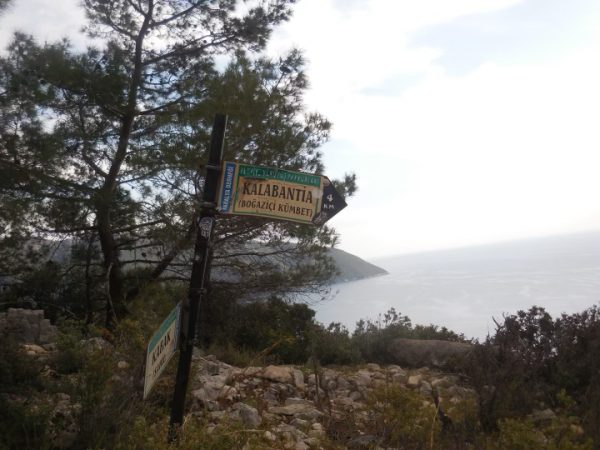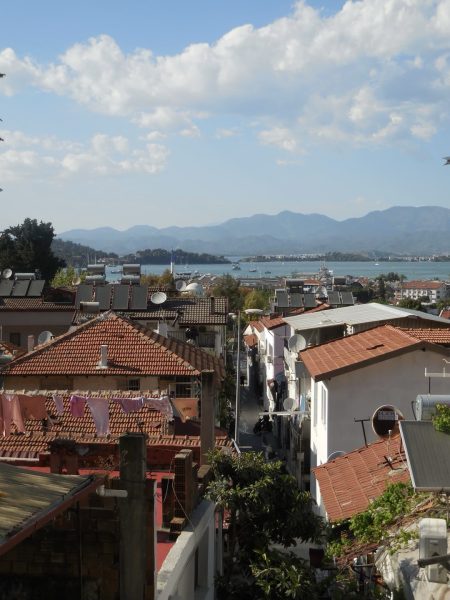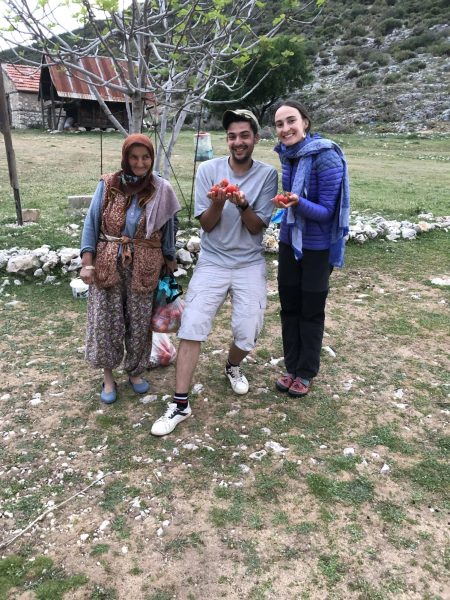In the face of uncertainty, trust your gut. You wander from reason and calculation, tuning into your senses; the butterflies in your stomach, the hair standing on your arms, the unshakeable feeling of right versus wrong. We tune in, guiding our experience; our safety; our self-confidence. But wind changes, glares blind, coffee spills, and life strikes, so your gut has to miscalculate now and then, right? Maybe, to take heed of our intuitive signals is an ability neither linear nor inherent, but instead a manifesto of all the times our hunches were tested.
You’re probably wincing from the pretentious stench of adolescent self-searching, and trust me, so am I. But it is from this poor woman’s half-baked philosophy that the dust of my journey unsettles, and the dwelled-on returns to mind. And so, I set the scene – a sunny March day on the Bosphorus, the inter-sea strait splitting the city of Istanbul between continents, its token melting pot charm. A sentimental Nevadan watches tankers ebb in and out of view aided by Otis Redding and a Turkish brew. She fulfills the exchange student archetype, except in the place of partying stands pensive afternoons spent wandering through cobbled streets to reach concrete museums connected to marble mosques. Though fascinated by the fast-paced metropolis, after two months she began feeling drowned by the man-made; deafened by the humming of 20 million lives.
She is me, and so I got on a plane, seeking shelter in the mountains along the Lycian Way. The footpath, spanning 525 km along the Mediterranean coast of southeastern Turkey, seized my agenda like wildfire; it was a strikingly perfect escape from the city. Following the Bronze Age ruins of the Lycian Kingdom, the path is decorated by ancient elements of democratic life – trails marked by honorable courts and hand-carved sarcophagi. Because the constraints of academia allotted me only 11 days, I would complete a third of the official route, with only my start in Fethiye set in stone; all else to be played by ear. Debarking my cheap flight, my pack felt light, the most common innocent optimism every trek must begin with. I prided myself in my hodgepodge packing – a tent from a classmate, a sleeping bag from a neighbor, a creative first aid kit, and my seasoned hiking boots. My gloating ended abruptly, for my journey had begun and I would soon be humbled by the stress of decision-making as a woman, alone, camping in the Turkish wilderness.
My first day was spent wandering the coastal streets of Fethiye, its turquoise ports vibrant and its cliff-carved tombs haunting. In Turkish fashion, I was soon welcomed by an elderly gentleman onto what was a pirate-themed party boat some years ago. He introduced himself as Captain Ibo, offering tea and conversation. Ibo became a friend, as I learned of his past as a fisherman on the wharf and his present as a retiree with a knack for horse betting. After much broken endearment, Ibo inquired if I would sleep on his boat before my walk would bring me to the next village, to which I kindly declined.
Fethiye, its turquoise ports vibrant and its cliff-carved tombs haunting. In Turkish fashion, I was soon welcomed by an elderly gentleman onto what was a pirate-themed party boat some years ago. He introduced himself as Captain Ibo, offering tea and conversation. Ibo became a friend, as I learned of his past as a fisherman on the wharf and his present as a retiree with a knack for horse betting. After much broken endearment, Ibo inquired if I would sleep on his boat before my walk would bring me to the next village, to which I kindly declined.
Though genuine and positive, my time with Ibo illustrated the broader terms characteristic of solo travel. In one palm rests the guilt of not fully embracing an experience while the other holds the wisdom to not always need to push your luck. During my instantaneous weighing of risk with Ibo, I concluded my luck was still too fresh to be tried. Yet, even before my first steps were planted, my palms were weighed by the conditions of self-sufficiency. To ensure my safety and my spirit, I would have to experience both the freedom and the confinement of listening to my intuition.

The following days presented vast diversity, a barely followable path leading me below towering batholiths and over goat-grazed hilltops. The Mediterranean blue remained more often than not in my periphery, her composure supporting the grandest of sunsets and sunrises. I lazily enjoyed their marriage of elements from the comfort of my A-frame. Unforgettable friends were made fleetingly; violent sheepdogs were fought off belligerently.
On my second to last evening on the trail, I sought refuge on a park bench in a village so remote it may have to remain nameless. My 35 km day had rendered my legs and brain useless as I gathered the strength to find a friendly pasture for my teeny tent. Rising to my feet, a petite and brittle figure emerged from a nearby home. Intently hobbling towards me, the elderly Turkish farm woman hollered what may have been a welcome or possibly an interrogation. After discombobulated translation back and forth, it was apparent she had invited me to her home as a guest for dinner and a rest, free of charge. As the sun descended, we harvested tomatoes and scattered feed for chickens, later sharing a homecooked meal of yogurt, pasta, aubergine, and cucumbers. Into the night we struggled to understand each other – she meticulously scribbled print as I translated what I could. We dabbled in small talk of popular references (mostly to American politics), but as conversation slowed, I noticed she was eating very little and clearly in pain. She lifted her shirt to reveal a mosaic of tumors covering her stomach, cursing her condition: “kanser.” Into the night, I consoled the recluse through tears of her dreaded mortality and her reality of constant loneliness.
While devastated for this stranger, I felt uneasy – a discontent I could neither name nor resolve. At one point, she ceased her monologue, leading me to my pack where I had left it in her sunroom. She motioned to remove all money from my bag, in case someone was to steal it, a warning I felt strange given the size of the village. Eventually proving my exhaustion, she granted me liberty to turn in for the night. As I lay in the dark of the woman’s sunroom, clutching my phone, passport, wallet, and pocketknife inside of my sleeping bag, I turn my head to see her watching through the window from her living room, retreating to her parlor when she realized I was still awake. Why this textbook horror movie alarm hadn’t sprung me straight out and onto the trail beats me, for I slept just fine that night.
The hand of my host chucked a metal can at a neighboring dog, sounding my wake up that morning. A silent breakfast of olives, hard-boiled eggs, and more yogurt was shared, but my evacuation could not come sooner. After scrubbing dishes and fluffing my pillows, I expressed my gratitude and stretched for my getaway. Yet, my exit would not be so seamless – she demanded 600 lira in compensation for her hospitality. Politely, I resisted, appealing to the humanity we shared and the selflessness
that she had preached when I had arrived. But as her voice grew angrier, I caved, handing her 200 lira as I stepped towards the door. She remained unsatisfied and even more offended as she stepped in my path, filling my vision with waving fingers and my ears with screeches of greed. Once I had finally fled, I was 600 lira poorer, and suffering a more considerable blow to my morale.
Huffing and puffing down the trail, I couldn’t decipher whether I was angrier at her for her wretchedness, or angrier at myself for my vulnerability. In retrospect, I could identify every caution my body had given me, yet had I idly entertained my guest hood out of cultural respect? Out of the weight of this person’s tragedy? The first 10 kilometers of the dawn were spent
repeating incantations of self-loathing. But once that ground had been covered, I reflected differently – I am not to lament my ration (or lack thereof), but instead, scorn my intuition that so blatantly lured me to be taken advantage of. This occupied the following 15 kilometers of the descent to my final destination at the sea. As I relentlessly dwelled on, the cycle took form; angry dwelling amounted to disappointed dwelling, amounted to exhaustion, amounted to defeat. By no means was my loss a mourning tale of the roughly 20 dollars I had been swindled of, but instead, a funeral for my confidence. Though my mind remained in her home, reliving moments of empty compassion, my body bounded forward toward my inconsequential finish line.
 Breaking through one last canopy, I was met by a sinking sun over a magenta peninsula. A separate sea of emotions emerged. I envisioned the old woman’s eyes teeming with remorse as I left her sitting on her front porch. I felt the warmth of fire and friendship I had the liberty of sharing nights before with fellow hikers. I tasted the beautiful meals prepared by many hands along my path. I realized it is impossible to turn to my intuition as something greater than myself; something all-knowing. My ability to experience the good pays homage to my familiarity with the good. In another vein, my young life sustains little intuitional familiarity with the unwanted. Despite its diversity of avenues, I choose to trust my intuition, accepting the necessity of both good and bad as my lived experience is subconsciously charted. The city below wove into the melting sea as I set up camp one last time. I figured that was enough dwelling for one day and rested bittersweetly hoping one tortured woman’s chickens would eat well tonight.
Breaking through one last canopy, I was met by a sinking sun over a magenta peninsula. A separate sea of emotions emerged. I envisioned the old woman’s eyes teeming with remorse as I left her sitting on her front porch. I felt the warmth of fire and friendship I had the liberty of sharing nights before with fellow hikers. I tasted the beautiful meals prepared by many hands along my path. I realized it is impossible to turn to my intuition as something greater than myself; something all-knowing. My ability to experience the good pays homage to my familiarity with the good. In another vein, my young life sustains little intuitional familiarity with the unwanted. Despite its diversity of avenues, I choose to trust my intuition, accepting the necessity of both good and bad as my lived experience is subconsciously charted. The city below wove into the melting sea as I set up camp one last time. I figured that was enough dwelling for one day and rested bittersweetly hoping one tortured woman’s chickens would eat well tonight.


